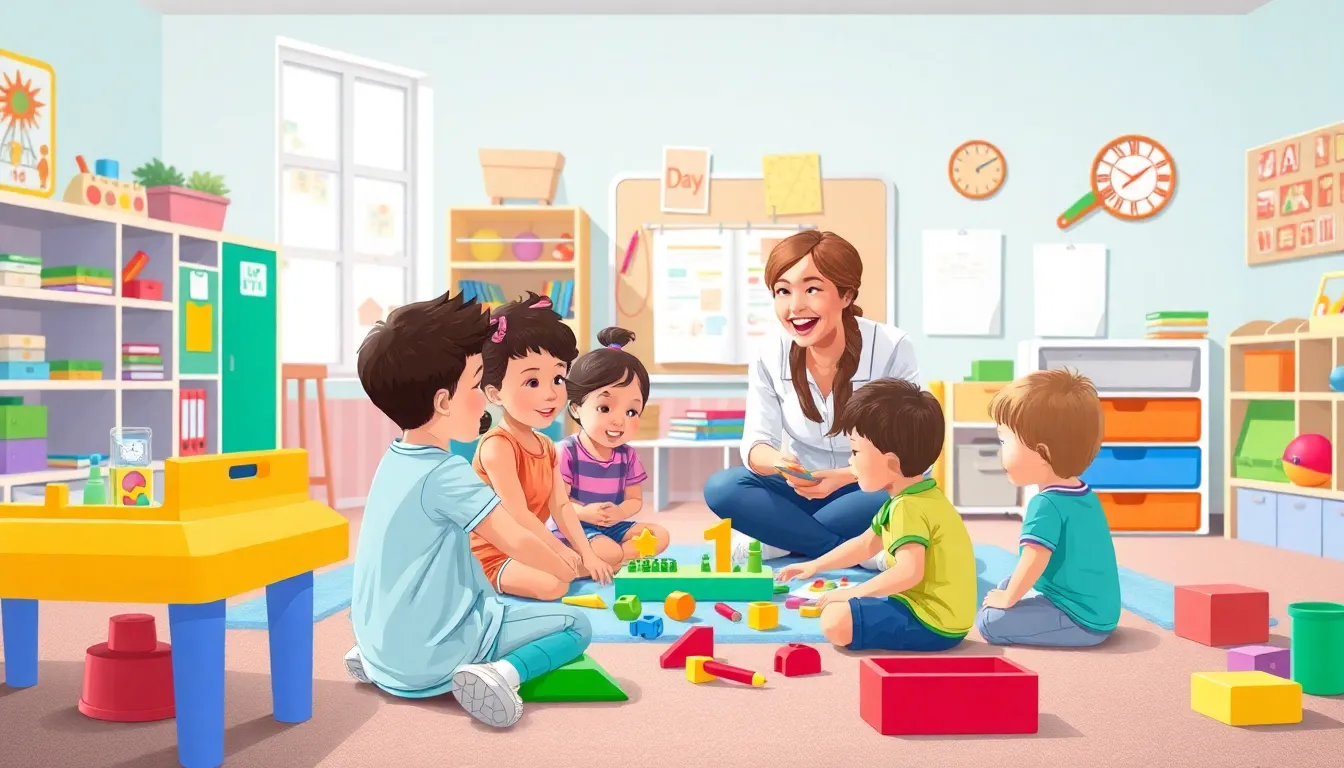When it comes to shaping the future, few fields are as rewarding (and occasionally chaotic) as child development. Imagine a career where you can help little ones discover their potential while dodging flying toys and sticky fingers. It’s a world where every day brings new challenges and giggles, and where making a difference is just part of the job description.
Table of Contents
ToggleOverview of Child Development Careers
Child development careers encompass various roles focused on enhancing children’s growth and learning. These professionals work in diverse environments, including schools, clinics, and community organizations. Each role requires specific skills to support children during crucial developmental stages.
Educational roles, such as teachers and child psychologists, provide direct support in learning and emotional well-being. Teachers implement tailored curriculums to address different learning styles. Child psychologists assess developmental challenges and create intervention strategies to foster mental health.
Occupational therapists aid children in developing essential skills for daily living. Using targeted activities, they support children with disabilities or developmental delays. Speech-language pathologists also play a vital role by addressing communication challenges. They facilitate language development through tailored therapeutic techniques.
Early childhood educators focus primarily on children aged three to five, laying the foundation for lifelong learning. These professionals create enriching environments that stimulate curiosity and social interaction. Additionally, social workers engage with families to promote a nurturing atmosphere conducive to healthy growth.
Career paths in child development also include roles in research. Professionals in this area study child behavior and development trends, providing valuable insights for effective practices. Nonprofit organizations often hire specialists to advocate for children’s rights and improve community resources.
In short, careers in child development offer various opportunities to impact children’s lives positively. The blend of educational, therapeutic, and advocacy roles creates a rich landscape for those passionate about nurturing young minds. Each position contributes to fostering a healthier, more supportive environment for children.
Types of Careers in Child Development

Careers in child development span various fields, each fulfilling a crucial role in a child’s growth. Professionals in this industry focus on enhancing children’s well-being and learning experiences.
Healthcare Careers
Healthcare careers in child development encompass roles that address children’s physical and mental health needs. Pediatricians specialize in children’s overall health, providing medical care and diagnosis. Child psychologists help children navigate emotional and behavioral challenges, utilizing therapy techniques tailored for young minds. Additionally, occupational therapists assist children in developing everyday skills, while speech-language pathologists target communication disorders. Each of these positions plays a vital role in ensuring children achieve optimal health and developmental milestones.
Educational Careers
Educational careers focus on fostering learning environments that support children’s academic growth. Early childhood educators lay the groundwork for lifelong learning through structured activities that promote cognitive and social skills. Special education teachers work with children with disabilities to create inclusive learning experiences tailored to individual needs. Curriculum developers design engaging educational materials, ensuring that early childhood education remains relevant and effective. These roles are essential in shaping how children approach learning during formative years.
Therapeutic Careers
Therapeutic careers within child development address emotional and behavioral well-being. Play therapists use play as a medium to help children express feelings and cope with challenges. Art therapists utilize creative expression to promote healing and self-discovery in young clients. Behavioral therapists design interventions that target specific behavioral issues, guiding children towards healthier patterns. Each of these therapeutic professions plays a significant part in helping children overcome obstacles and build resilience.
Skills Required for Child Development Careers
Strong communication skills benefit professionals in child development careers. Individuals must convey ideas and information clearly to children, parents, and colleagues. Empathy plays a critical role, as understanding children’s emotions and perspectives fosters supportive environments.
Creative problem-solving capabilities enable practitioners to address diverse developmental challenges. They often devise innovative strategies tailored to individual needs, ensuring effective engagement and learning. Patience is essential when working with children, as progress can occur gradually and requires nurturing guidance.
Collaboration skills are vital for success. Many professionals work in teams, engaging with teachers, healthcare providers, and families to create comprehensive support systems. This teamwork enriches the developmental process and ensures consistent messaging for children.
Knowledge of child psychology and development principles enhances expertise. Staying current with the latest research and methodologies promotes effective practices in working with children. Cultural competence also contributes to the ability to engage with diverse families and communities, respecting and valuing different backgrounds.
Leadership qualities benefit educators and therapists, as they often guide children through various programs and activities. These roles may involve training and mentoring other professionals as well. Organization helps manage multiple responsibilities and track children’s progress effectively, providing structured support for their growth.
Critical thinking skills assist in assessing children’s needs and determining appropriate interventions. Monitoring progress and adjusting strategies based on observed outcomes remains essential for success in child development careers. Understanding legislation and ethical considerations related to child welfare adds another layer of competency, ensuring compliance with professional standards.
Job Outlook and Opportunity
The job outlook for careers in child development remains strong. According to the Bureau of Labor Statistics (BLS), employment for childcare workers is projected to grow by 2% from 2021 to 2031. Growth opportunities exist in various settings, including schools, clinics, and community organizations. Positions such as special education teachers are expected to see a faster increase, with a projected growth rate of 8% during the same period.
In healthcare, the demand for pediatricians and child psychologists continues to rise due to an increasing awareness of mental health issues among children. Occupational therapists and speech-language pathologists also face heightened demand as more children require specialized services. The need for early childhood educators remains steady as parents increasingly prioritize quality education for their children.
Various child development roles provide opportunities for specialization. Professionals can focus on areas like behavioral therapy, play therapy, or even curriculum development, enhancing their career prospects. Nonprofit organizations, advocating for child welfare, also seek dedicated professionals to expand community resources, presenting additional opportunities.
Networking plays a critical role in career advancement. Attending industry conferences, joining relevant associations, and engaging in community outreach facilitate connections and enhance visibility in the field.
Overall, career prospects in child development offer a diverse range of possibilities for individuals passionate about making a difference in children’s lives. With a strong emphasis on education, health, and emotional support, the field is poised for continued growth, allowing professionals to thrive.
Careers in child development offer a unique blend of challenges and rewards for those dedicated to nurturing young minds. With a variety of roles available across healthcare, education, and therapy, professionals can find their niche while making a significant impact on children’s lives.
The demand for skilled individuals in this field continues to grow, reflecting the increasing awareness of children’s needs and the importance of early intervention. By honing essential skills like communication, empathy, and critical thinking, individuals can thrive in these roles and contribute to a brighter future for children.
As the landscape of child development evolves, opportunities for specialization and advancement will only expand, making it an exciting time to embark on a career in this vital area.




